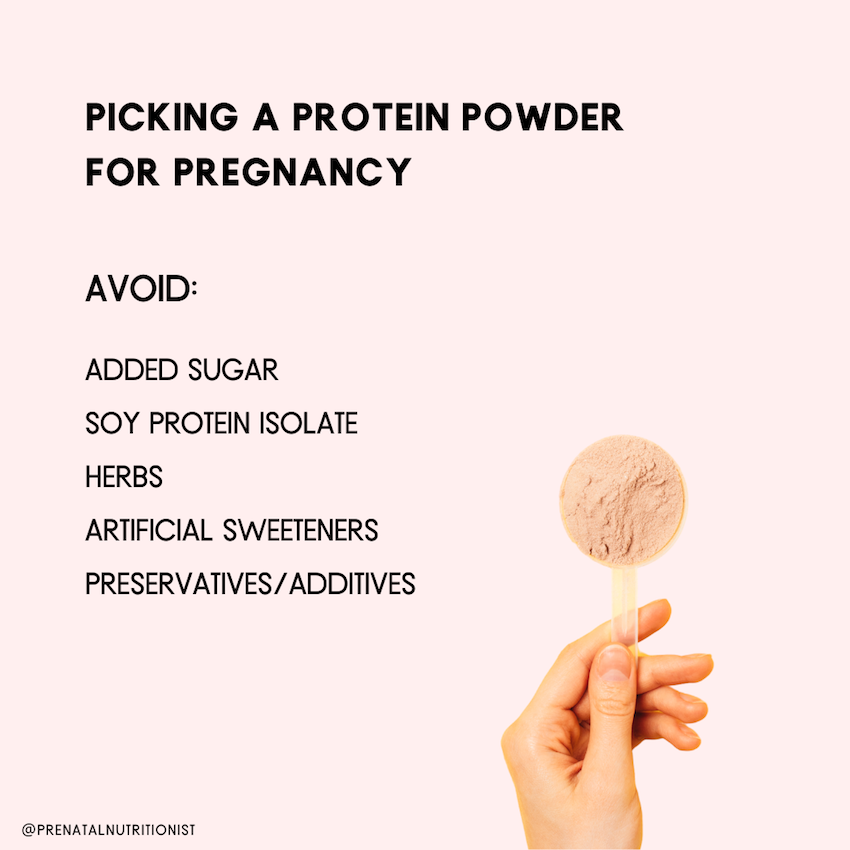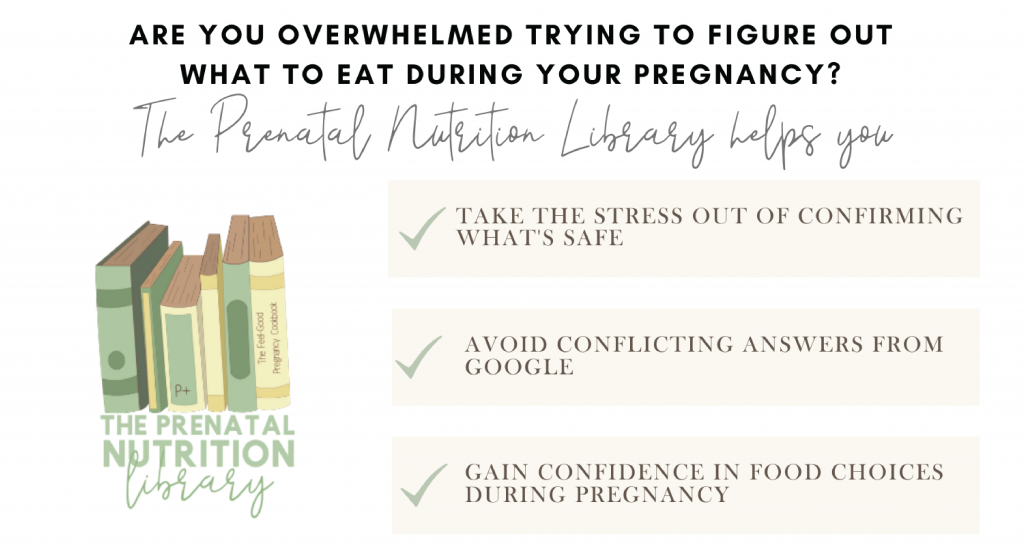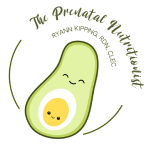Protein powder for pregnancy
There are several types of protein powders that have really only recently risen in popularity.
The population that typically includes protein powders in their diet the most is serious athletes as they have increased needs for protein and dietary supplements. However, everyday athletes and even those who don’t partake in physical activity use this convenient, quick source of protein.
Add it to coffee, smoothies, oatmeals, soup, or shake it up with water and you have a quick 10-25 grams of protein.
For any population, foods high in protein should always be the first choice. This is in short because protein foods include much more than just protein. That being said, during pregnancy, you may be wanting to add protein powder in your diet for two practical reasons.
Similar to athletes’ reasoning, protein needs are higher during pregnancy and continue to climb through each trimester, therefore it may be challenging to meet your needs.
The Prenatal Nutrition Library will help you calculate your unique protein needs and give you a full list of pregnancy approved protein powders (use code 50off at checkout, for 50% off your first month!)
The second reason might be nausea or food aversions. When nausea hits, food intake suffers and protein is typically the first to go.
During this time, smoothies can be extremely helpful in getting many of the food groups.
Smoothies are an easy way to get in fruit, veggies, fats, and protein. It’s essential to include all of these components! For informational purposes only, let’s take a look at protein powders and what to look out for!
Are protein powders safe when you are trying to conceive or pregnant?
Yes, and no. As stated above, the majority of your daily protein must come from food sources. Fish, chicken, beef, and eggs to name a few, provide more than protein. They are not only protein-rich foods but they also provide essential vitamins and minerals.
Does your protein powder also contain vitamins and minerals?
A protein powder or protein shake that also includes vitamins and minerals could be potentially problematic if you are also taking a prenatal vitamin.
You can get too much of a good thing in the way of supplements. If you are taking a well-rounded prenatal vitamin, you do not need your protein powder to contain vitamins and minerals.
Are there other risks?
The other risk not yet mentioned is possible contamination with heavy metals like lead, arsenic, cadmium, or mercury. This is because the supplement industry (this includes protein powders) is not well-regulated.
The FDA leaves this up to the individual manufacturer and there’s no way to tell if they are being truthful in its safety, quality, or quantity of ingredients.
This is why choosing supplements that are “third party tested” by medical reviewers is essential, especially for prenatal vitamins. This is voluntary testing some companies choose to partake in to verify their products is, in fact, safe and quality. Look for the clean label project on protein powder labels.
Keep in mind that “detectable” heavy metals in products like protein powders do not necessarily correlate to “harmful” levels.
What ingredients should you avoid in protein powders?
Added sugar
A diet high in sugar (added and natural) can lead to excessive weight gain, blood sugar imbalances, a large baby, and increases your chances of developing gestational diabetes (1, 2).
While we don’t need to completely eliminate sugar from our diet, we do need to be aware of where it is coming from. The American Heart Association recommends limiting added sugar to 25 grams (6 teaspoons) or less per day for women (3). I’d much instead save my sugar intake for a sweet treat, not for my protein powder.
Processed soy (soy protein isolate)
Soy is a hotly debated topic in the nutrition world, and rightly so, it’s confusing with new research coming out every day. Not all soy is created equally, and unfortunately, you probably haven’t been told the whole story.
Soy, unless fermented, is high in phytic acid which can affect mineral absorption (4). Pregnancy is a time when your mineral needs increase, and you must get enough for baby to grow; we certainly don’t need anything working against that.
Ironically, soy can also interfere with protein digestion (5). The point of adding protein powder to your diet is to increase your protein intake, right?
Soy can affect your thyroid hormone production by interfering with iodine absorption (6). This is important for all pregnant women, not just those with thyroid complications. This is also important for those trying to conceive as soy has been shown to affect fertility (7).
Last, but not least, soy is highly contaminated with pesticide residue, specifically glyphosate (8). Glyphosate continually shows to be harmful to developing fetuses in the literature (9).
Soy protein isolate is a very processed form of soy and far from healthier soy products such as natto or miso.
Artificial sweeteners
Common artificial sweeteners include sucralose, aspartame, saccharin, neotame, and acesulfame-K. Despite what most people think, artificial sweeteners can still affect your blood sugar mainly through your gut microbiome (10). They may also interfere with thyroid function which is a vital organ for a healthy pregnancy (11).
Lastly, a rather shocking study suggests that artificially sweetened beverages during pregnancy can affect the birth size and even overweight/obesity in the offspring 7 years later (12).
Although this was artificially sweetened beverages, this can easily be translated to protein powders sweetened with artificial sweeteners, mainly if used daily.
Another study completed in 2016 in humans, showed artificial sweeteners may affect infant BMI (13). So, in conclusion, limit the artificial sweeteners listed above.
Not new, but now popular sweeteners like stevia, sugar alcohols, and monk fruit extract are being used in exchange for the artificial sweeteners discussed above, obviously, for good reason.
While research is not plentiful on these sweeteners, so they should still be ingested in moderation, they seem to be safer alternatives for the health of you and your baby.
Herbs
Many protein powders include “green” or “superfood” blends that often list a slew of herb-based powders.
While this may seem rather harmless and “natural,” there are many herbs that haven’t been proven safe for pregnancy and should be avoided when choosing a protein powder. In the same sentence, many haven’t been proven unsafe either. Basically, if we have no clear evidence suggesting positive effects and no clear evidence suggesting safety, why include them in your diet?
We just don’t know, so it’s best to limit or avoid herbs in supplements, powders, and protein shakes.
Preservatives/additives
Common additives in protein powders are things like thickeners, artificial flavoring, and coloring. Some you may have seen include alginin, guar gum, locust bean gum, and xanthan gum.
Others include agar, carboxymethyl cellulose, pectin, and carrageenan. While most are considered GRAS (generally recognized as safe) by the USDA, some have more recently begun to be further investigated.
For example, carrageenan was voted to be removed from the National Organic Standards Board in 2016 (14), if we can limit the number of preservatives ingested before and during pregnancy, the better.

Types of protein powders
Whey and casein protein
Whey and casein are the two predominant proteins in milk. In fact, Whey accounts for about 20% and casein 80%. Interestingly, breast milk is 60% whey protein.
Whey and casein protein are not dairy-free for those that are lactose-intolerant or sensitive to dairy. They are both products of cheese production and are then turned into powders. Both contain all the essential amino acids, unlike some plant-based proteins.
Whey protein digests much faster, which is why it is preferred to build muscle mass quickly. Casein still boosts muscle growth over time, helps you recover from exercise, and may even provide other health benefits.
Whey protein has been studied extensively since it is hugely popular in the bodybuilding and athletics world, however, because of this, the majority of studies are completed in athletes and focused on how it helps build muscle mass.
In the preconception and pregnancy period, we want to focus our energy on getting in as many nutrients as possible while ensuring an appropriate weight, not building muscle. Although strength exercises are important during pregnancy, the focus is to regulate weight gain and prepare for labor!
But, are either of these protein powders safe for pregnancy? Yes, just as milk and cheese are safe, they are safe when turned into powders.
Hemp protein
Hemp protein is a plant-based protein-based from grinding hemp seeds into a powder.
Very little research exists on hemp protein in non-pregnant individuals, and there is no research in pregnant individuals. However, hemp seeds are safe to consume during pregnancy, so grinding them into a powder doesn’t change their composition.
Hemp seeds and hemp seed powder provides fiber, omega-3’s, and minerals like zinc, iron, copper, and magnesium. If you are a vegetarian, this could be a beneficial choice, but keep in mind, hemp seeds are not a complete protein, meaning they do not contain all the essential amino acids.
Pea protein
Pea protein is another plant-based protein made from yellow split peas. Yellow split peas are higher in protein than your typical green pea.
Pea protein is generally very well tolerated and is high in branched-chain amino acids (BCAA’s). Research indicated pea protein is equally as good as whey protein in helping to increase muscle mass (15). However, this is far from the primary concern during pregnancy.
Some studies suggest pea protein can increase feelings of fullness and lower blood pressure; however, neither of these results have been demonstrated in pregnant women (16, 17, 18).
Like hemp protein, pea protein is not a complete protein so you want to make sure you are consuming other sources of complete proteins. If you are looking for a plant-based protein powder to supplement your diet, this could be the answer for you.
Collagen peptides (hydrolyzed collagen or collagen hydrolysate)
You can learn more about collagen and glycine needs during pregnancy in the note under “macronutrients,” but we will briefly review this here. Collagen is the most abundant protein in the body and found in the connective tissue (ligaments and tendons), bones, skin, organs, and also, in our blood vessels, corneas, and teeth.
So, collagen peptides are these pieces of animals ground into a powder. You can find collagen peptides from bovine sources and marine sources. Many companies also offer bone broth collagen powder in chicken or beef varieties.
Research shows collagen peptides are safe to consume during pregnancy (19). After all, it is similar to eating meat; it’s just ground into a powder.
You will also get similar benefits from gelatin powder, which is how jello is made. However, Jello adds a lot of added sugar. If you wish, you can make your own jello by using gelatin powder and adding your own sweetness.
Collagen peptides provide additional protein while increasing your intake of the amino acid glycine, a winning combo in my book.
Rice protein
Rice protein powders are generally made from brown rice and like the other plant-based protein powders listed above, not a complete source of protein. Some studies suggest one issue with brown rice protein powder is the arsenic levels (20). Although some brands test for arsenic levels ensuring this is not an issue.
There is relatively little research on rice protein powder in non-pregnant individuals and no research that we could locate in pregnant women.
Besides ensuring you meet the initial criteria for picking a protein powder, there’s no reason rice powder would be unsafe for pregnancy.
Mixed protein powders
Some companies create a blend of proteins into one powder, such as a mix of hemp, pumpkin, and flax powder.
Again, keeping in mind the criteria for picking a protein powder above should be okay before and during pregnancy. Be extra careful here on soy protein isolate. Blends often like to throw this one in. I do not recommend soy protein isolate before or during pregnancy.
Do I need to include protein powder in my diet?
This is a question everyone should be asking themselves at this point. If you are no longer suffering from nausea and food aversions, eat a good mixture of animal and plant proteins. And can meet your protein needs through food, there is no reason to add this powder to your diet as a dietary supplement. Wondering if your getting enough protein or the best sources for pregnancy? Check out The Prenatal Nutrition Library for a protein calculator and full guide (don’t forget to use code 50off at checkout!)
If you don’t eat meat or even don’t eat a lot of meat, you may be at risk of low protein intake and, therefore, low glycine intake. If this is the case, either bone broth or collagen peptides may be essential for you as a protein source.
The Prenatal Nutrition Library includes more information on glycine needs during pregnancy.
The bottom line
- Protein powder during pregnancy is safe with some exceptions.
- Protein from real food sources is ideal.
- Protein powder for pregnancy can be helpful when you are suffering from nausea or food aversions.
Are you feeling confused about what’s safe (and not) during pregnancy?
The Prenatal Nutrition Library was built to help you feel confident in your food choices for two. In the library, we provide examples of protein powders and protein requirements that fit the above descriptions and review prenatal vitamins.











